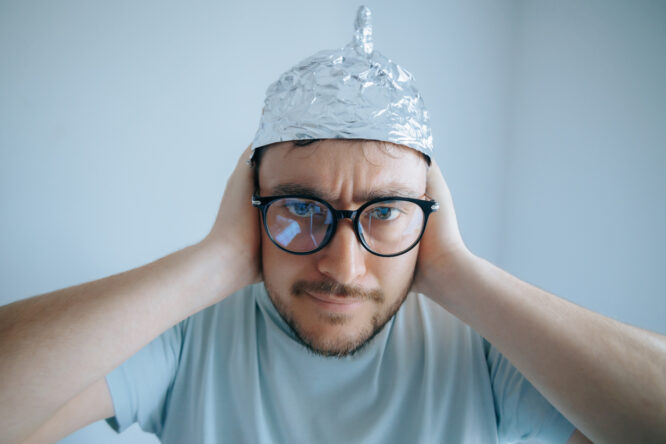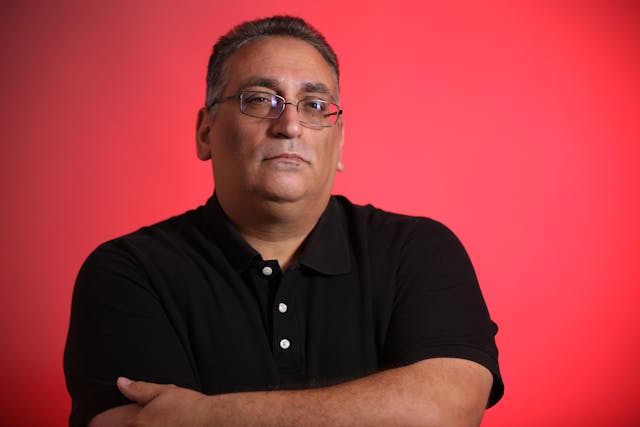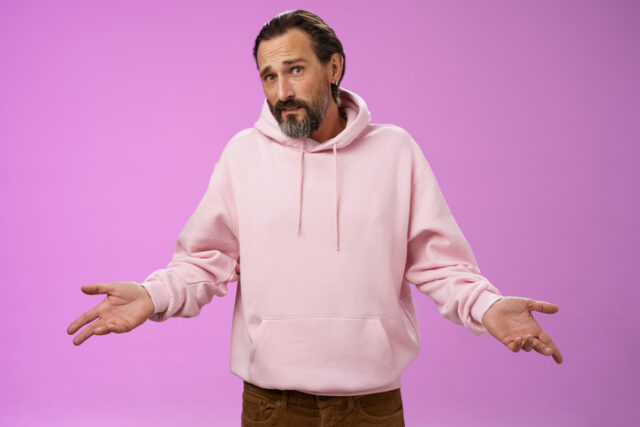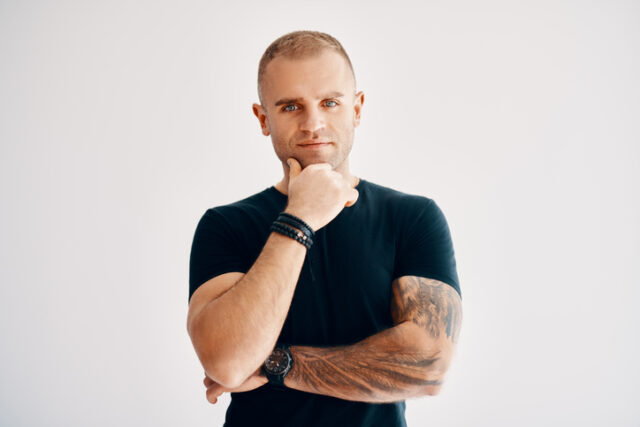We all know someone who rolls their eyes the second science gets mentioned.

Maybe it’s about climate change, vaccines, evolution, or even gravity—somehow, there’s always a “Yeah, but…” ready to go. These people tend to speak with confidence, even when what they’re saying is more YouTube conspiracy than peer-reviewed research. And while it can be mildly entertaining (or wildly frustrating), the things they say follow a pretty familiar pattern. If you hear these phrases flying around, chances are someone’s about to go full tinfoil hat.
1. “It’s just a theory.”

This one gets wheeled out constantly, especially in arguments about evolution or climate change. The issue? In science, a theory isn’t a random guess—it’s a well-tested explanation that fits loads of evidence. However, people who use this phrase tend to think “theory” means “vibe.”
They don’t realise that things like gravity and germ theory are also “just theories” by that logic. So unless they plan on floating off into space or licking doorknobs, maybe they do trust science more than they think.
2. “Scientists change their minds all the time.”

Yes. That’s the point. Science changes when there’s new information. It’s not about sticking to a belief out of stubborn pride—it’s about getting closer to the truth as better data comes in. That’s a strength, not a flaw. However, people who hate science usually say this like it’s proof of a lie, like researchers should’ve nailed down everything forever in 1703. Meanwhile, they’ll happily update their phone 17 times a year without questioning it once.
3. “Follow the money.”

This one’s a classic. If a scientific claim goes against their opinion, it must be because someone’s getting rich off it. Never mind that the science might be funded by a university or public institution with no agenda—it’s all Big Pharma, Big Climate, or Big Telescope. Ironically, they’ll then go share a “truth video” made by someone who’s literally selling supplements, survival gear, or dodgy detox teas, but somehow that’s not suspicious. That’s “just someone trying to help.”
4. “I did my own research.”

This might be the most overused phrase of the last decade. Spoiler: watching a two-hour video on Facebook isn’t the same as spending eight years studying biochemistry. Sadly, that doesn’t stop them from thinking they’ve cracked the code. “Doing your own research” tends to mean “found a blog post that told me what I already believed.” There’s nothing wrong with being curious, but curiosity without filters is just falling headfirst into nonsense.
5. “They just want to control us.”

From mask mandates to 5G towers, everything becomes part of a secret plan to control the population. Which raises the question: if the goal really is control, why are we still allowed to Google conspiracy theories 24/7? That kind of thinking usually says more about personal distrust than any real evidence. It’s easier to believe in invisible puppet masters than accept the messy reality that humans are just trying to figure things out.
6. “The truth is being silenced.”

Ah yes, the hidden truth—being suppressed… but also somehow trending on social media with millions of views. It’s hard to keep something a secret when it’s on ten podcasts, eight Telegram channels, and every comment thread on the internet. This phrase gives people the thrill of feeling like an insider, like they’re part of something exclusive. But when everyone has the “hidden truth,” maybe it’s not that hidden after all.
7. “Science used to say the Earth was flat.”

Nope. That was never mainstream science. Ancient Greek philosophers figured out the Earth was round over 2,000 years ago. The flat Earth idea was mostly cultural, not scientific, and even sailors in the 1500s knew better. Still, it gets dragged up like a trump card, as if the existence of historical ignorance cancels out everything we’ve learned since. By that logic, we should still be bloodletting and using leeches for headaches.
8. “They’ve been wrong before.”

Of course they have. That’s literally part of the process. Science doesn’t claim to be perfect—it just corrects itself over time. Unlike certain social media influencers who double down no matter how off they are. When people say this, they usually ignore how many things science has been right about, like antibiotics, vaccines, weather forecasting, or, you know, electricity. It’s selective memory, plain and simple.
9. “I trust my gut more than some expert.”

Look, your gut is great for deciding what to eat, but it’s not a reliable instrument for evaluating virology or astrophysics. Yet somehow, a vague “feeling” trumps years of research and data in these conversations. That mindset turns every debate into a vibe contest. While vibes are great, they’re not a substitute for understanding how the immune system works.
10. “Nature will take care of everything.”

This one’s popular with the “no need for medicine” crowd. Yes, nature is powerful. But so is tetanus. And smallpox. And food poisoning. Nature isn’t always nice—it’s just indifferent. The same people who say this often drive cars, use GPS, and eat pre-packaged food from the supermarket. If you truly trust nature, enjoy drinking from a stream and rubbing leaves on your open wounds.
11. “Scientists are all in on it.”

It’s wild how many people think every scientist on Earth is part of some massive, well-oiled conspiracy. As if hundreds of thousands of researchers are secretly meeting in caves to plan society’s downfall. In reality, scientists can barely agree on coffee preferences in the break room, let alone orchestrate a world takeover. Collaboration? Yes. Collusion? Not so much.
12. “That’s just what they want you to think.”

The mysterious “they” again. Who are they? No one knows, but apparently, they’ve been working overtime to control thoughts, hide truths, and invent diseases. This catch-all phrase gets dropped when there’s no actual argument left. It shuts down conversation instead of engaging with facts. Convenient? Yes. Convincing? Not really.
13. “You can’t trust peer review.”

Peer review isn’t perfect, but it’s still way more reliable than Dave’s TikTok breakdown of how the moon is fake. At its best, it’s a system where experts check each other’s work to weed out nonsense. But science-deniers love this line because it gives them a way to discredit anything they don’t like. If nothing is valid, then everything they say is fair game, which is exactly how pseudoscience thrives.
14. “Real science doesn’t need to hide behind credentials.”

This is basically saying, “I don’t need a pilot, I’ll fly the plane myself.” Credentials exist because some things actually take a lot of skill, training, and understanding. Would you let a random person perform surgery on you because they “feel confident”? Hopefully not. Yet for some reason, science is treated like a personality quiz anyone can ace with enough sass.
15. “They made up climate change to sell electric cars.”

This one tries to link a massive, decades-long scientific consensus to a car advert. Climate change isn’t a marketing gimmick—it’s been studied, documented, and measured since before Teslas existed. While electric cars are one solution, pretending the entire climate crisis was invented to boost sales is like saying the NHS was created to keep paracetamol in business.
16. “My uncle works in science and he says it’s all rubbish.”

Everyone has an “uncle” who apparently knows the truth. Usually, this uncle has never published a paper or worked in the relevant field, but that doesn’t stop him from being quoted like he’s Einstein. This is anecdotal backup dressed up as expert opinion. And while we all love a good story, personal opinions don’t outweigh decades of rigorous research.
17. “If science is so great, why do people still get sick?”

Because bodies are complicated and disease exists. No one ever said science was magic, but it has massively increased life expectancy, lowered infant mortality, and saved millions of lives through prevention and treatment. This line ignores all the progress science has made because it doesn’t offer perfection. It’s like asking why we still have traffic accidents if seatbelts exist. It misses the point entirely.
18. “Science used to say smoking was good for you.”

That was marketing, not science, and once the actual science caught up, it corrected the record. The mistake wasn’t in the data—it was in who got to speak the loudest before the data was there. Using this as a reason to distrust all science today is like saying, “Well, my grandad didn’t wear a seatbelt, so I won’t either.” It’s flawed logic clinging to outdated examples.
19. “The data can be manipulated.”

Sure, data can be twisted. That’s why we have peer review, replication, and critical analysis. However, that doesn’t mean all data is fake. It means we need good systems to check it, not throw it out completely. People who say this usually aren’t asking for better data—they just want to ignore the data that makes them uncomfortable. It’s not about truth. It’s about convenience.
20. “I just use common sense.”

Common sense is fine for crossing roads or choosing lunch, but it doesn’t always hold up when we’re talking about viruses, space-time, or ecosystems. Those things aren’t intuitive—they’re complex. Saying “I trust common sense over science” is often just a polite way of saying, “I don’t want to learn anything new.” That’s fair, but let’s not pretend it’s a position of strength.




